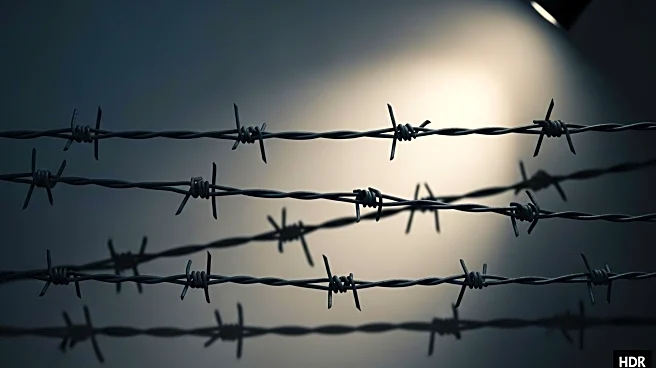What's Happening?
Syrian authorities have arrested a Hezbollah cell in the Damascus countryside, marking a significant development in the ongoing tensions between Syria's new leadership and the Iran-backed Lebanese group. The arrest was carried out by special forces and the General Intelligence Directorate, who found the detainees in possession of rocket launchers, Grad rockets, anti-tank missiles, and other ammunition. The suspects are currently undergoing interrogation, and the case has been handed over to judicial authorities. Hezbollah has denied any involvement, stating they have no presence or activity on Syrian soil. This arrest is part of a broader effort by President Ahmad al-Sharaa’s government to crack down on perceived threats to Syria’s security, often described as remnants of the Assad regime.
Why It's Important?
The arrest of the Hezbollah cell highlights the shifting dynamics in Syria as the new leadership seeks to reduce the influence of the Iranian-led Shiite axis, which was deeply entrenched under the previous government. This move could have significant implications for regional stability, as Hezbollah has been a key player in the Syrian conflict, supported by Iran. The crackdown on Hezbollah-linked activities may alter the balance of power in the region, affecting Iran's strategic interests and potentially leading to increased tensions between Syria and Iran. Additionally, the ongoing efforts to curb smuggling operations along the Syria-Lebanon border could impact the flow of arms and resources, influencing the security situation in both countries.
What's Next?
The Syrian government's actions against Hezbollah may lead to further diplomatic and military responses from Iran and Hezbollah, as they seek to maintain their influence in the region. The situation could escalate if Hezbollah decides to retaliate or increase its activities in Syria. Additionally, the Syrian government may continue its crackdown on other groups perceived as threats, potentially leading to more arrests and heightened security measures. Regional stakeholders, including Lebanon and Iran, will likely monitor the situation closely, as any changes in Syria's internal dynamics could have broader implications for regional alliances and conflicts.
Beyond the Headlines
The arrest of the Hezbollah cell underscores the complex geopolitical landscape in Syria, where various factions vie for power and influence. The Syrian government's actions may be seen as an attempt to assert its sovereignty and independence from external influences, particularly Iran. This development also raises questions about the future of Syria's relationship with Iran and Hezbollah, as well as the potential for new alliances to emerge. The situation highlights the ongoing challenges faced by Syria in achieving stability and rebuilding after years of conflict.











